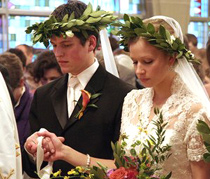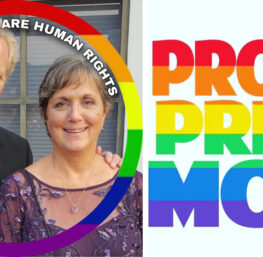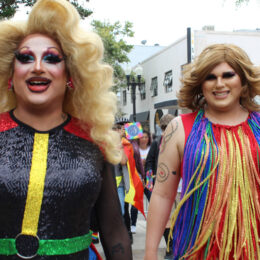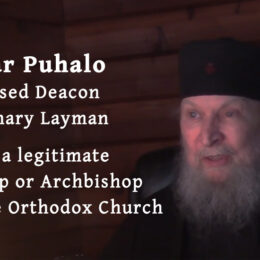 by Deacon Keith Fournier –
by Deacon Keith Fournier –
True marriage is the preeminent and the most fundamental of all human social institutions. It is a relationship defined by nature itself and protected by the natural law that binds all men and women. It finds its foundation in the order of creation. Civil institutions do not create marriage nor can they create a “right” to marry for those who are incapable of marriage. …
It seems that almost weekly there is another assault on true marriage. The unrelenting efforts of an activist wing of the homosexual community have nearly succeeded in reframing the issues of the debate. They aim to enforce a Cultural Revolution. They have been joined by eager collaborators in the Judiciary and elected officials who believe they are some kind of new “liberators”.
Notice the pervasive use of the language of this new Cultural Revolution. There are few news reports using the word marriage for what it is, ontologically, the lifelong union between one man and one woman ordered toward love, the conception and rearing of children and the formation of family, which is the foundation of society because it is its first vital cell.
The verbal engineers have changed the language and convinced everyone, even many Christians who should know better, to use their new revolutionary vocabulary. Everything is recast to sound as though those who seek to defend true marriage somehow oppose its extension to homosexuals and lesbians, who are incapable of it.
The distinction between so called “traditional’ Marriage and all other “marriages” is a serious mistake, the most decisively fatal volley in this early verbal skirmish. I warned many with whom I share this monumental struggle to defend true marriage against this assault and not to use the term “traditional” as an adjective. There were a number of reasons I opined about the dangers of this propaganda ploy. All have proven to be correct.
those who seek to redefine the word marriage and then destroy the institution which is the cornerstone of civil society are involved, knowingly or unwittingly, in a return to a pagan practice.
It sounds like those who defend true marriage want to turn the clock back and live in the past. It paints us as opposed to progress, as though we oppose a new advance in social and cultural evolution which will lead to greater freedom and cultural sensitivity. Nothing could be further from the truth! The fact is that those who seek to redefine the word marriage and then destroy the institution which is the cornerstone of civil society are involved, knowingly or unwittingly, in a return to a pagan practice. They are unleashing moral and legal anarchy.
In my writing I warned against ever using the word “marriage” when referring to homosexual partnerships. This warning did not come from some personal hostility toward homosexual persons, but out of honesty and verbal integrity. Homosexual relationships simply cannot constitute a marriage.
As a lawyer and activist of many years, working for authentic freedom, I knew that in the battle to change culture, the softening of the language is the most effective early action before a wholesale assault waged in the courtrooms, the legislatures and the media. Also, I know that such language softens and eventually destroys the vigilance of those who are caught unaware of its ruthless and corrosive effect on the long term struggle.
Finally, I warned of the use of “rights” and “freedom” language is the greatest weapon in this new Cultural Revolution. When the effort to legalize the killing of innocent children in the first home of the whole human race, their mother’s womb, was couched in the language of “privacy”, “choice” and “freedom”, the effort advanced and the infamy of abortion on demand was accomplished. There is an accelerating effort to make homosexual partnerships the legal equivalent of marriage in the positive law and to then use the Police Power of the State to enforce such a restructuring on the rest of civil society.
When sexual behavior between two men or two women is viewed as the foundation of some “right” to marry and those who oppose this equivalency movement are characterized as being against the “freedom” to marry and “equal rights”, we are in serious danger of losing the struggle to the wordsmiths. Sadly, that is precisely what has now happened.
True marriage is the preeminent and the most fundamental of all human social institutions.
True marriage is the preeminent and the most fundamental of all human social institutions. It is a relationship defined by nature itself and protected by the natural law that binds all men and women. It finds its foundation in the order of creation. Civil institutions do not create marriage nor can they create a “right” to marry for those who are incapable of marriage. The institutions of government should, when acting properly, defend marriage against those who would redefine it.
Government has long regulated marriage for the common good. For example, the ban on polygamy and age requirements were enforced in order to ensure that there was a mature decision at the basis of the Marriage contract. Heterosexual marriage, procreation, and the nurturing of children form the foundation for the family, and the family forms the foundation of civil society.
To “limit” marriage to heterosexual couples is not discriminatory now, nor has it ever been. Homosexual couples cannot bring into existence what marriage intends by its very definition. To now “confer” the benefits that have been conferred in the past only to stable married couples and families to homosexual paramours is bad public policy.
The current cultural situation we face as Christians in America is not an unfamiliar one. We need to see it now in terms of Christian history. I do not care how “scientifically advanced” we think we have become, or how “modern” the issues purport to be, we humans do not really change all that much, at least without grace. The struggle we are engaged in as Christians in contemporary western culture still concerns a clash of worldviews, personal and corporate, and competing definitions of freedom.
Christians (at least orthodox, faithful ones) are often presented as unenlightened, forcing “our view” on others. When, in fact, our positions on marriage, family, authentic freedom, the dignity of every human person, and the nature of truth as objective.. are what frees people from the bondage of disordered appetites. These truths are objectively true for all men and women. We were made for relationship. We were structured for authentic love and human flourishing within family and a society founded upon family.
The early Church was sent into cultures filled with people who thought they were extremely “advanced” in light of the arts and sciences of their day. Yet, these cultures practiced primitive forms of abortion and even “exposure”, a practice of leaving unwanted children on rocks to be eaten by birds of prey or picked up by slave traders. To them, freedom was rooted in a notion of power over others and the right to do as they chose.
One has only to read the ancient Christian manuscripts such as the Didache (the Teaching of the Twelve) or the accounts of Justin Martyr or other early sources to read of cultures not unlike the one in which we live today, cultures of “use” where people were treated as property – cultures of excess where “freedom” was perceived as a power over others and unrestrained license masqueraded as liberty, where homosexual sexual practices were prevalent.
Our contemporary age is increasingly pagan.
The word “pagan” was not used as a disparaging term. It represented a pseudo-“religious” worldview. It does once again. Our contemporary age is increasingly pagan. Many of the “gods” and goddesses” of the old pagan regimes and worldview promoted these lives of selfish excess, homosexual practices, and hedonism masquerading as freedom. In fact the myths concerning them had them acting in much the same way. They have been reintroduced today, only the myths, tributes and statues are different.
The early Christians did not point the finger and rail against the “pagans” of their age. They did not present a “negative” message. They proclaimed the freedom found in Jesus Christ to all who would listen and demonstrated it in their compelling witness of life. They lived in monogamous marriages, raised their children to be faithful Christians and good citizens, and went into the world of their age, offering a new way to live. This “way” (which is what they first called the early Church) presented a very different worldview than the one that the pagans embraced.
These early Christians, with joy and integrity, spoke and lived a different way in the midst of that pagan culture. As a result, they sometimes stirred up hostility. Some of them were martyred in the red martyrdom of shed blood. Countless more joined the train of what use to be called “white martyrdom”, by living lives of sacrificial witness and service in the culture, working hard and staying faithful to the end of a long life spent in missionary toil.
early Christians, with joy and integrity, spoke and lived a different way in the midst of that pagan culture.
Slowly, not only were small numbers of “pagans” converted and baptized, but eventually their leaders and entire Nations followed suit. Resultantly, the Christian worldview began to influence the social order. The “clash of freedoms” continued, but the climate changed significantly. It was the Christian faith and the practices of these Christians that began to win the hearts of men and women. The cultures once enshrined to pagan practices, such as plural marriage, homosexuality, exposure and abortion began to change dramatically and this dynamic continued for centuries.
It was Christianity that taught such novel concepts as the dignity of every person and their equality before the One God. The Christians proclaimed the dignity of women, the dignity of chaste marriage and the sanctity of the family. It was Christianity that introduced the understanding of freedom not simply as a freedom from, but as a freedom for living responsibly and with integrity.
The Christians insisted that freedom must be exercised with reference to a moral code, a law higher than the emperor, or the shifting sands of public opinion. It was the Christians who understood that choice, rightly exercised, meant always choosing what was right and that the freedom to exercise that choice brought with it an obligation and concern for the other.
Christians insisted that freedom must be exercised with reference to a moral code
Their faith presented a coherent and compelling answer to the existential questions that plagued the ancients, such as why we existed and how we got here. What was the purpose of life? Questions like how evil came into the world and why we could not always make right choices? What force seemed to move us toward evil and how we could be set free from its power?
Christian philosophy began to flourish and the arts also flourished under the Christian worldview. Philosophies of government and economic theory began to be influenced by these principles derived from a Christian worldview. Now, we are called to transform our own American and Western culture from within once again.
We must be faithful citizens, run for office, and never give up our struggles in the courtroom, the classroom, or the marketplace of commerce, all for the common good. Our social and cultural mission is not an option. It lies at the heart of what it means to be “leaven”, “light”, “salt” and the “soul of the world” as the early Christians taught.
However, we need to realize that the task we face is first, at root, a spiritual struggle that will first be won in prayer, stepped into a new Christian missionary movement by the compelling witness of a vibrant, orthodox, faithful Christianity that is culturally engaging, relevant and compelling to the new pagans of our age.
True marriage and family have been inscribed by the Divine Architect into the order of the universe.
True marriage and family have been inscribed by the Divine Architect into the order of the universe. They are God’s idea and not our own. Marriage is the first vital cell of society and creates the first society wherein children are to be raised so that they can fully develop and flourish. Children have a right to a mother and a father. Yes, there are broken homes and single parent homes and we must always provide a compassionate social framework for those families. True marriage and family are the social foundation and glue of any truly just society. They are now under an assault.
The Judges and the legislative branch have elevated themselves to the place reserved only for the One who fashioned the universe and created marriage. Emperor Worship has returned in the form of an imperial judiciary! Judges simply decide that God’s plan has no real legal authority, because they had spoken! God have mercy upon them and upon all who will enter the abyss because of their infamy.
Our challenge as Christians has now begun. We need to rededicate ourselves to living like Christians in our families, at our workplaces and in our neighborhoods. We need, as the early Church understood so well, to be a visible, palpable reflection of the truth about marriage and family. True marriage and family is the way of the future not the past.
The contemporary re-emergence of ancient paganism is not the path to authentic human freedom and flourishing but to misery. The Christian understanding of marriage and family is not some outdated notion of a past era but the framework for a future of true freedom. We are living in a new missionary age. The mission field is our own beloved Nation and Western Culture. Defending marriage is defending the common good.
HT: Catholic Online.




I believe your opinion is, simply put, wrong. You’re welcome to it, but I think you are wrong. What you think of my opinion is irrelevant to me. And what my opinion is of you is irrelevant to you because I’m not the boss of you. And you are not the boss of me, even though you try with your long, drawn-out, and unreadable text.
You take many, many paragraphs to cover the fact that you are judging other people and the choices they make, as if you have any say in other people’s lives. You do not, unless someone wants you to comment on their life.
Simply put, your faith, your opinion, and your book of rules is totally irrelevant to me. What I think of myself, my opinion, and my book of rules is what is relevant to me.
Why don’t you try minding your own business, practice love instead of hate, let others live according to their own conscience, and stop worrying about who is marrying who. It’s NONE of your business!
BTW, I could care less if you publish my comment. You read it, and you were the target audience. :p
one last thing, comments do not await moderation. do you even know what moderation means?
Moderation, noun
1. The avoidance of excess or extremes, esp. in one’s behavior or political opinions.
2. The action of making something less extreme, intense, or violent.
Are you the same Karen King as listed here:
http://religionandpluralism.org/KarenKing.htm
Inquiring minds would like to know.